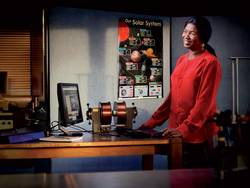Meet Francisca Okeke, Professor of Physics at the University of Nigeria, Nsukka. She recently received the L’Oreal-UNESCO for Women in Science Award for her significant contributions to the understanding of daily variations of the ion currents in the upper atmosphere which may further our understanding of climate change. She was also the Dean in the faculty of Physical Sciences at her University, from 2008 to 2010.
Professor Okeke spoke with us about her background and inspiration, the cultural challenges she overcame in achieving success and how she uses her position to encourage and inspire young women scientists in Nigeria.
What challenges did you face, in particular, with regards to the stereotypes of women and the culture in your country, Nigeria, when you decided to get involved in science?
In the past, the core sciences such as physics were regarded as male domains where women were expected not to be seen but to be heard. People used to think that when you get into these core science subjects, like physics, the characteristics that are most worthily accepted for women in our society, including passivity, emotionality, intuition and receptivity would no longer be possessed by that woman. Therefore they fought against women trying to embark on studying these core subjects.
But, my own case was a little different; my father was an old graduate of mathematics who was my mentor, so I did not face that in my family because he was supportive of everything about science. Not only did he encourage me, he was my mentor. He planted and watered the seed of my academic excellence which we are celebrating today. He laboured and inspired my love for science in general, and mathematics in particular. That love for mathematics later metamorphosed into a special love for physics.
"To a father growing old, nothing is dearer than a daughter." Euripides

Comments